初中英语语法复习 基本句型翻译
- 格式:doc
- 大小:123.50 KB
- 文档页数:3
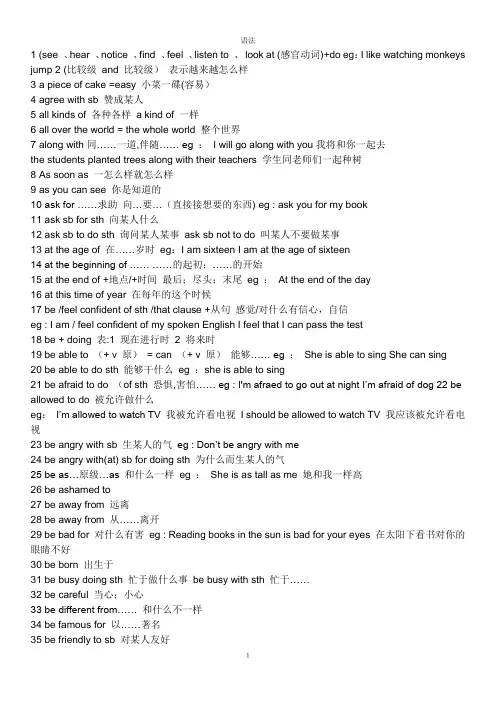
1 (see 、hear 、notice 、find 、feel 、listen to 、look at (感官动词)+do eg:I like watching monkeys jump2 (比较级and 比较级)表示越来越怎么样3 a piece of cake =easy 小菜一碟(容易)4 agree with sb 赞成某人5 all kinds of 各种各样a kind of 一样6 all over the world = the whole world 整个世界7 along with同……一道,伴随…… eg :I will go along with you我将和你一起去the students planted trees along with their teachers 学生同老师们一起种树8 As soon as 一怎么样就怎么样9 as you can see 你是知道的10 ask for ……求助向…要…(直接接想要的东西) eg : ask you for my book11 ask sb for sth 向某人什么12 ask sb to do sth 询问某人某事ask sb not to do 叫某人不要做某事13 at the age of 在……岁时eg:I am sixteen I am at the age of sixteen14 at the beginning of …… ……的起初;……的开始15 at the end of +地点/+时间最后;尽头;末尾eg :At the end of the day16 at this time of year 在每年的这个时候17 be /feel confident of sth /that clause +从句感觉/对什么有信心,自信eg : I am / feel confident of my spoken English I feel that I can pass the test18 be + doing 表:1 现在进行时2 将来时19 be able to (+ v 原)= can (+ v 原)能够…… eg :She is able to sing She can sing20 be able to do sth 能够干什么eg :she is able to sing21 be afraid to do (of sth 恐惧,害怕…… eg : I'm afraed to go out at night I’m afraid of dog 22 be allowed to do 被允许做什么eg:I’m allowed to watch TV 我被允许看电视I should be allowed to watch TV 我应该被允许看电视23 be angry with sb 生某人的气eg : Don’t be angry with me24 be angry with(at) sb for doing sth 为什么而生某人的气25 be as…原级…as 和什么一样eg :She is as tall as me 她和我一样高26 be ashamed to27 be away from 远离28 be away from 从……离开29 be bad for 对什么有害eg : Reading books in the sun is bad for your eyes 在太阳下看书对你的眼睛不好30 be born 出生于31 be busy doing sth 忙于做什么事be busy with sth 忙于……32 be careful 当心;小心33 be different from…… 和什么不一样34 be famous for 以……著名35 be friendly to sb 对某人友好136 be from = come from 来自eg :He is from Bejing He comes from Bejing Is he from Bejing ?Does he come from Bejing ?37 be full of 装满……的be filled with 充满eg: the glass is full of water the glass is filled with water38 be glad+to+do/从句39 be going to + v(原)将来时40 be good at(+doing)= do well in 在某方面善长, 善于……41 be good for 对什么有好处eg : Reading aloud is good for your English42 be happy to do 很高兴做某事43 be helpful to sb 对某人有好处eg : Reading aloud is helpful to you 大声朗读对你有好处Exercising is helpful to your bady 锻炼对你的身体有好处44 be in good health 身体健康45 be in trouble 处于困难中eg : She is in trouble They are in tronble46 be interested in 对某方面感兴趣47 be late for = come late to 迟到eg:Be late for class 上课迟到48 be like 像…… eg :I'm like my mother49 be mad at 生某人的气50 be made from 由……制成(制成以后看不见原材料)51 be made of 由……制成(制成以后还看得见原材料)52 be not sure 表不确定53 be on a visit to 参观54 be popular with sb 受某人欢迎55 be quiet 安静56 be short for 表**的缩写eg:陶is short for 陶俊杰57 be sick in bed 生病在床58 be sorry to do sth be sorry for sb eg : I am sorry for you59 be sorry to hear that 60 be sorry to trouble sb eg :I am sorry to trouble you61 be strict in doing sth 严于做某事eg :He’s strict in obeying noles62 be strict with sb 对某人要求严格eg:Some students are not strict with them selves 这些学生对自己不严格63 be strict with sb in sth 某方面对某人严格64 be supposed to do 被要求干什么65 be sure 表确定66 be sure of doing sth 对做某事有信心eg:He is sure of winning I am sure of learning English well67 be sure of sth 对做某事有信心eg:I’m sure of my head (my teacher 我相信我的大脑(老师)68 be sure that sth 对做某事有信心eg: I’m suer that he can pass the test 我相信他能通过考试69 be sure to do sth一定会做某事eg:We are sure to pass the test 我们一定会通过这次考试We are sure to learn English well 我们一定能学好英语70 be terrified of + 名/动doing 害怕……271 be terrified to do sth 害怕做某事72 be the same as …和什么一样73 be used to doing sth 习惯做某事eg:My father is used to getting up early 我爸爸习惯早He is used to sleeping in class 他习惯上课睡觉74 be worth doing 值得做什么75 be(feel)afraid to do sth 害怕做某事be afraid of sth 害怕某物be afraid that 丛句76 because+句子because of +短语eg :He was late because he had a headache He was late because of his headache77 begin to do = start to do 开始做某事start…with…=begin…with… 以什么开始什么eg :Let’s begin the game with the song I begin to go home78 between…and… 两者之间79 borrow sth from sb 向……借…… lend sth to sb (lend sb sth 借给……什么东西eg :I borrowed a pen from him he lent a pen to me (he lent me a pen80 both = the same(as) = not different(from)表相同81 bother 打扰bother sb to do stheg :I’m sorry to bother you ,but can you tell me to way to the station我十分道歉打扰你,但是你能告诉我怎么去车站the problem has been bothering me for weeks 这个问题困扰了我几个周了He’s bothering me to lend him money82 by the end of 到……为止83 call sb sth eg :We call him old wang84 care 关心eg :Don’t you care about this country’s futu re ?你为什么不关心国家的未来85 catch up with sb 赶上某人86 chat with sb 和某人闲谈take sb to + 地点带某人去某地87 come in 进88 come over to 过来89 come up with 提出eg:Can you come up with a good idea 你能想出一个好办法吗?90 communicate with sb 和某人交流91 consider + doing 考虑做什么eg :Why not consider going to lu zhou 为什么不考虑去泸州?92 dance to 随着……跳舞eg :She likes dancing to the music 她喜欢随着音乐跳舞93 decide to do sth 决定做某事94 do a survey of 做某方面的调查95 do better in 在……方面做得更好96 do wrong 做错97 Don't forget to do sth 不要忘了做某事98 Don't mind +doing /从句/名词不要介意……99 each +名(单)每一个…eg :Each student has many books 每一个学生都有一些书100 end up +doing101 enjoy +doing喜欢3102 escape from 从……逃跑eg:The prisoners have escaped from the prison犯人从监狱里逃跑出来103 expect to do sth 期待做某事104 fall down 摔下来fall off 从哪摔下来105 fall in love with sb /sth 爱上什么106 far from 离某地远eg :The school is far from my home107 find +it +adj +to do 发现做某事怎么样108 find sb/sth +adj 发现什么怎么样eg :I find the book interesting109 finish 完成+doing(名词)110 fit to sb = be fit for sb 适合某人111 forget to do 没有做而忘了forget doing 做了而又忘了eg:Don’t forget to go home I forget closing door112 from…to… 从某某到某某eg:From me for her113 get /have sth down 做完,被(别人)做…eg: I have my hair cut 我理了发(头发被剪了)Tom got his bad tooth pulled out 汤母把他的坏牙拔掉了(被牙医拔掉了)114 get a part-time job= find a part—time job115 get along well with sb = get on well with sb 与某人相处得好116 get along with sb = get on with sb 与某人相处117 get ready for = be ready for为什么而准备eg : I get ready for math I am ready for math 118 get sb in to trouble 给某人麻119 get sb to do sth120 get…from… 从某处得到某物121 give a talk 做报告eg:He is give a tall122 give sth to sb give sb sth 给某人某物123 go fish 钓鱼go swimming 游泳124 go on to do 去做下一件事go on doing 继续做这件事125 go out away from go out of126 go to school 上学(用于专业的)go to the school 去学校(不一定是上学)127 good way to 好方法128 hate to do 讨厌没做过的事hate doing 讨厌做过的事129 have a party for sb 举办谁的晚会130 have a talk 听报告谈一谈131 have been doing 现在完成进行时eg : You have been talking You have been sleeping since 132 ha ve been to …( 地方)……去过某过地方have gone to …(地方)去了某地还没回来133 have fun +doing 玩得高兴134 have sth to do 有什么事要做eg:I have a lot of homework to do 我有很多家庭作业要做I have nothing to do 我没什么事情做135 have to do sth 必须做某事136 have trouble (problem)(in) doing sth 做什么事情有麻烦137 have…time +doing4138 have…(时间)…off 放……假eg:I have month off 我请一个月得假139 hear sb +do/doing 听见某人做某事/正在做某事140 help a lot 很大用处141 help sb with sth \one's sth 帮助某人某事(某方面)help sb (to) do sth 帮助某人做某事142 hope to do sth 希望做某事143 How about(+doing)= What about(+doing)144 how do you like = what do you think of 你对什么的看法145 if : 是否=wethereg: I don’t know if (wether)I should go to the party 我不知道我是否应该去参加晚会He don't know if (wether)we will arrive on time tomorrow morning 他不知道我们明天早上是否能准时到达146 if :如果,假如(全部接一般时态)+条件语态从句eg:I’ll go to LuZhou if it does’t rain 假如明天不下雨,我就去泸州If they change the plan they will let me know 假如他们要改变计划,他们会让我知道的I’ll go to England ,if I have enough money next year 如果我明年由足够的钱,我就要去英国147 in one’s opinion = sb think 某人认为148 in some ways 在某些方面149 in the end = finally(adv)最后150 in the north of… 什么在什么的北方(north 北sowth 南west 西east 东)151 in the sun 在太阳下152 increase 增加eg : They’ve increased the prece of petrol by 3% 他们把石油价增加了3%the population has increased from 12 million ten years ago to 18 million now153 instead of +(名) 代替eg:I’d like an apple instead of a pear 我想要苹果,而不要梨子I like English instead of math 我喜欢英语而不喜欢数学154 introduce sb to sb 介绍某人给某人introduce oneself 自我介绍155 invite sb to do sth 邀请某人做某事156 It takes sb sometime to do sth 做某人花掉某人多少时间eg : It took me 5 minutes to do my homework It takes me half an hour to cook157 It’s +adj +for sb to do sth 对某人来说做某事怎么样158 It’s +adj +to do 做某事怎么样159 It’s +adj for sb 对于某人来说怎么样It’s +adj of sb 对某人来说太怎么样160 It’s +adj(for sb)to do(对某人来说)做某事怎么样It’s +adj of sb to do sth 对某人来说做某事太怎么样eg : It’s nice of you to help me with my English161 It’s a good idea for sb to do sth 对…… 来说是个好主意162 It’s important to sb 对某人来说很重要eg:It's important to me163 It's t ime to do sth It’s time for sth 到了该去做某事的时间eg : It’s time to have class It's time for class 该去上课了5164 join = take part in 参加165 just now 刚才166 keep +sb /sth +adj /介词短语让什么保持什么样?167 keep out 不让…… 进入168 keep sb adj 让……保持…… eg: I want to keep my mo ther happy keep healthy 保持健康169 key to +名词表示:某物的钥匙或某题的答案170 key to… anser to … key 可以是答题或钥匙171 laugh at… 取笑…… eg :Don't langh at others We langhed at the joke172 learn by oneslfe 自学173 learn from sb 向某人学习eg:We should learn from Lei Feng174 learn to do sth 学做某事175 let sb do sth 让某人做某事176 Let sb down 让某人失望eg :We shouldn’t let our farents down 我们不应该让我们的父母失望177 live from :离某地远178 live in +大地方/at +小地方居住在某地eg:I live in LuZhou She lives at XuanTan179 look after = take care of 照顾照看180 lose one’s way 谁迷路eg : Lose your way 你迷路181 make a decision to do sth 决定做某事182 make friends with sb 和谁成为朋友eg : I want to make friends with you183 make it early 把时间定的早一点184 make on exhibition of oneself 让某人出洋相185 make sb /n +n 使什么成为什么eg : I made her my step moller I made you my wife186 make sb /sth +adj 使某人(某物)怎么样eg :You must made your bed clean187 make sb /sth adj 使某人/某物怎么样188 make sb do sth 让某人做某事eg :I made him write 我以前让他写189 make up be made up of (被动语态)由……组成190 make…difference to…191 mind sb to do mind one's doing 介意……做什么192 most +名most of +代193 much too +形容词194 must be 一定195 need +名词196 need sb do sth 需要某人做某事197 need to do (实义动词) need do (情态动词)198 no /neithr of hate to do no /neithr of hate doing199 no +名词200 not anymore = no more 再也不…… eg: He didn't cry any more He cried no more 他再也不哭201 not… (形、副)at all eg:He’s not tall at all she doesn’t junp far at all202 not…at all 一点都不6203 not…either 表否定,也不eg :I don't japanse either I don’t have sister, either 我也没有姐姐204 not…until 直到……才……eg:I didn’t sleep until my mother came back The child didn’t stop crying until I give her sugar 205 offer / provide sb with sth 给某人提供206 offer sb sth ( offer sth to sb 提供什么东西给某人eg :I offer you water (I offer water to you 我给你提供水207 on one's way to… 在谁去那的路上208 on the one hand 一方面on the other hand 另一方面209 on the phone = over the phone 用电话交谈210 on time 准时in time 及时211 one day =some day =someday 一天,有一天212 one of +可数名词的复数形式213 one to another 一个到另一个214 over and over agin 一遍又一遍的eg :He cleaned the floor over and over agin215 part-time job 兼职工作fall-time job 全职工作216 pay for… 付……钱pay the bill 开钱,付钱217 please +do218 please help yourself219 pleased with sb220 pool into = pore into221 practice +doing 练习做某事222 prefer sth to sth 相对……更喜欢…… eg :I prefer physics to chemisty 在物理和化学中,我更喜欢物理prefer doing to sth 更喜欢去做…不愿意去做… eg:He prefers riding a bike to diving 他更喜欢骑自行车,不开小车prefer to do sth rather than do sth 宁愿做…也不愿eg:My unde prefers to buy a now car rather than repaiv the used one 我叔叔更喜欢买新的车,也不去修旧车prefer sb not to do sth 更愿意… eg:I prefer her not to come 我不喜欢她不来223 pretend to do sth 装着去做什么pretend that 从句eg :The two cheats pretended to be working very hard 这两个骗子装着努力工作He pretended that he did not know the answer 他装着不知道答案224 rather…than 宁可……也不……eg :I would rather be a doctor than a teacher 我愿肯当医生,也不当老师He likes dogs rather than cats 他喜欢狗,不喜欢猫225 regard…as 把……当作……eg: Please give my best regards to your family 请带我向你的家人我最好的问候I regard you as my friend 我把你当作我的朋友He shows little regard for others 他不爱关心别人226 remid sb about sth 提醒某人什么事remid sb to do sth 提醒某人做某事7eg :he remids me about cooking (he remids me to cook 他提醒我做饭227 remid sb of sth 使某人想起什么eg : the pictures remind me of my school days 这照片使我想起了我的学校the words that (which)the teacher talke to remind me of my mother228 return sth to sb 还什么东西给某人229 say to oneself 对自己说230 say to sb 对某人说231 sb spend somemoney on sth 花了多少钱在某事上232 sb spend sometime with sb 花了多少时间陪谁233 sb spend sometime(in) doing sth 花了多少时间做某事234 sb with sb +is sb and sb +are235 see sb do 看见某人做过某事see sb doing 看见某人正在做某事236 seem to do/be +adj 显得怎么样eg : You seem to be tired You seem to be happy237 send +sb sth 送给某人某物238 send…to…把什么寄到哪里去?239 shock 使……震惊eg :Oh , It’s only you !You give me a shock 啊,是你呀!吓我一跳240 show sb sth 向某人展示某物eg : I show her the book。
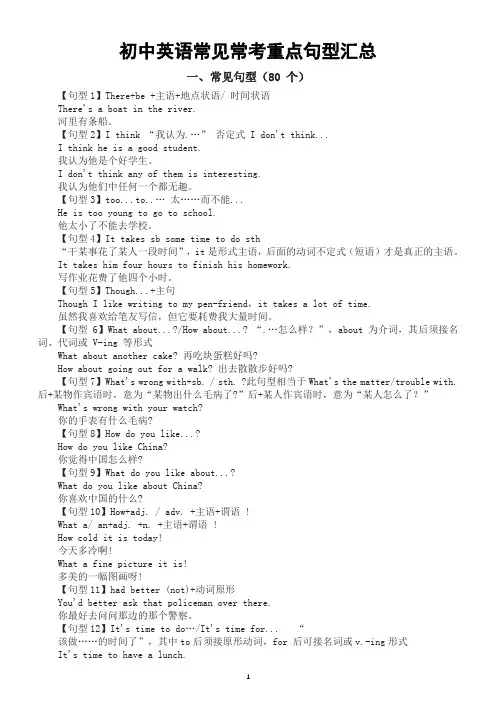
初中英语常见常考重点句型汇总一、常见句型(80 个)【句型1】There+be +主语+地点状语/ 时间状语There's a boat in the river.河里有条船。
【句型2】I think “我认为.…” 否定式 I don't think...I think he is a good student.我认为他是个好学生。
I don't think any of them is interesting.我认为他们中任何一个都无趣。
【句型3】too...to..… 太……而不能...He is too young to go to school.他太小了不能去学校。
【句型4】It takes sb some time to do sth“干某事花了某人一段时间”,it是形式主语,后面的动词不定式(短语)才是真正的主语。
It takes him four hours to finish his homework.写作业花费了他四个小时。
【句型5】Though...+主句Though I like writing to my pen-friend,it takes a lot of time.虽然我喜欢给笔友写信,但它要耗费我大量时间。
【句型6】What about...?/How about...? “.…怎么样?”,about 为介词,其后须接名词、代词或 V-ing 等形式What about another cake? 再吃块蛋糕好吗?How about going out for a walk? 出去散散步好吗?【句型7】What's wrong with+sb. / sth. ?此句型相当于What's the matter/trouble with.后+某物作宾语时,意为“某物出什么毛病了?”后+某人作宾语时,意为“某人怎么了?”What's wrong with your watch?你的手表有什么毛病?【句型8】How do you like...?How do you like China?你觉得中国怎么样?【句型9】What do you like about...?What do you like about China?你喜欢中国的什么?【句型10】How+adj. / adv. +主语+谓语 !What a/ an+adj. +n. +主语+谓语 !How cold it is today!今天多冷啊!What a fine picture it is!多美的一幅图画呀!【句型11】had better (not)+动词原形You'd better ask that policeman over there.你最好去问问那边的那个警察。
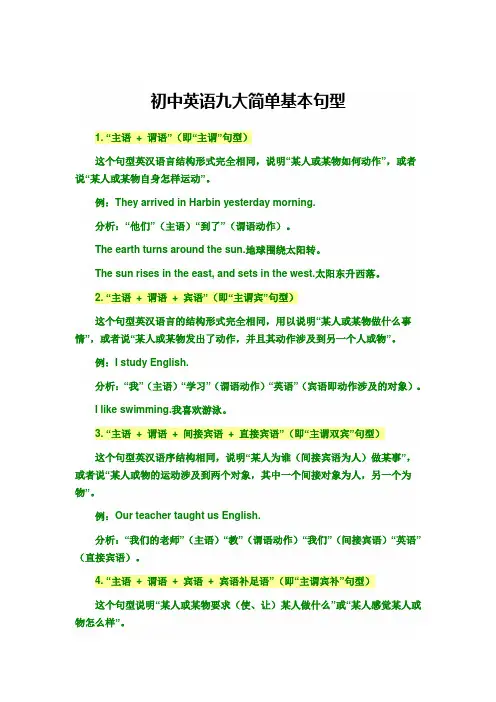
初中英语九大简单基本句型1. “主语+ 谓语”(即“主谓”句型)这个句型英汉语言结构形式完全相同,说明“某人或某物如何动作”,或者说“某人或某物自身怎样运动”。
例:They arrived in Harbin yesterday morning.分析:“他们”(主语)“到了”(谓语动作)。
The earth turns around the sun.地球围绕太阳转。
The sun rises in the east, and sets in the west.太阳东升西落。
2. “主语+ 谓语+ 宾语”(即“主谓宾”句型)这个句型英汉语言的结构形式完全相同,用以说明“某人或某物做什么事情”,或者说“某人或某物发出了动作,并且其动作涉及到另一个人或物”。
例:I study English.分析:“我”(主语)“学习”(谓语动作)“英语”(宾语即动作涉及的对象)。
I like swimming.我喜欢游泳。
3. “主语+ 谓语+ 间接宾语+ 直接宾语”(即“主谓双宾”句型)这个句型英汉语序结构相同,说明“某人为谁(间接宾语为人)做某事”,或者说“某人或物的运动涉及到两个对象,其中一个间接对象为人,另一个为物”。
例:Our teacher taught us English.分析:“我们的老师”(主语)“教”(谓语动作)“我们”(间接宾语)“英语”(直接宾语)。
4. “主语+ 谓语+ 宾语+ 宾语补足语”(即“主谓宾补”句型)这个句型说明“某人或某物要求(使、让)某人做什么”或“某人感觉某人或物怎么样”。
例:He asked her to go there.分析:“他”(主语)“要求”(谓语动作)“她”(宾语即动作涉及的对象)“去那里”(补语—补充说明宾语应做什么)。
5. “主语+ have + 宾语”(即“拥有”句型)这个句型主要用于说明“某人或某物拥有什么(宾语,即有形或无形的资源)”。
例:You have a nice watch. 你有一块漂亮的手表分析:“你”拥有一块漂亮的手表,即你拥有一个能够即时且漂亮的器具。
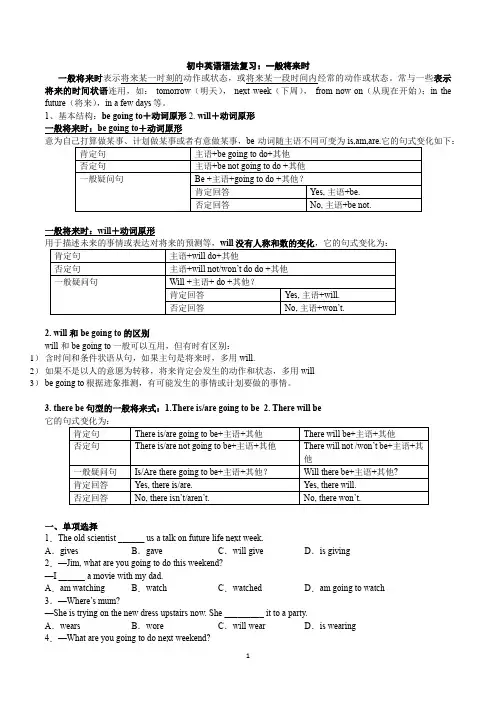
初中英语语法复习:一般将来时一般将来时表示将来某一时刻的动作或状态,或将来某一段时间内经常的动作或状态。
常与一些表示将来的时间状语连用,如:tomorrow(明天),next week(下周),from now on(从现在开始);in the future(将来),in a few days等。
1、基本结构:be going to+动词原形 2. will+动词原形一般将来时:be going to+动词原形一般将来时:will+动词原形2. will 和be going to 的区别will 和be going to一般可以互用,但有时有区别:1)含时间和条件状语从句,如果主句是将来时,多用will.2)如果不是以人的意愿为转移,将来肯定会发生的动作和状态,多用will3)be going to根据迹象推测,有可能发生的事情或计划要做的事情。
3. there be 句型的一般将来式:1.There is/are going to be 2. There will be一、单项选择1.The old scientist ______ us a talk on future life next week.A.gives B.gave C.will give D.is giving2.—Jim, what are you going to do this weekend?—I ______ a movie with my dad.A.am watching B.watch C.watched D.am going to watch3.—Where’s mum?—She is trying on the new dress upstairs now. She _________ it to a party.A.wears B.wore C.will wear D.is wearing4.—What are you going to do next weekend?—There __________ a basketball match next Sunday. I want to watch it.A.will be B.will have C.is going to have D.are going to be 5.—Which team ________ the football match?—I’m not sure. The two teams both play well. Let’s wait and see.A.wins B.won C.is winning D.will win 6.Robots ________ us do some heavy and difficult jobs in the future.A.help B.helped C.are helping D.will help7.—What are you going to do next weekend, Wang Hui?—I ________ my grandparents next Sunday.A.visit B.visitedC.am visiting D.am going to visit8.I don’t know if it ________ sunny tomorrow. If it ________ sunny, I will go fishing. A.will be; is B.is; will beC.will be; is going to be D.is; is9.We are going to have a farewell party ________.A.now B.every day C.last week D.next Friday 10.There is going to ________ a basketball match tomorrow.A.be B.have C.is D.are11.Look at the dark clouds in the sky. It ________.A.is going to rain B.rained C.raining D.rainy 12.What ________you ________for tomorrow’s party?A.did; wear B.will; wear C.do; going to wear D.do; do13.He ________ busy this week. He ________ free next week.A.is; is B.will; will be C.is; will be14.There are many black clouds in the sky. It ________ soon.A.will rain B.rains C.rained D.is raining 15.It ________ warm in Dalian tomorrow.A.will be B.is C.does16.She will ________ a book about animals after school.A.buys B.buy C.is buy D.going to buy 17.Mike ________ his room yesterday, and he is going to ________ his homework tomorrow. A.cleaned; do B.cleaned; did C.clean; do18.—Our library is bright and beautiful.—Yes. Will you ________ us ________ it?A.shows; to B.show; aroundC.shows; around D.show; to19.Look! There are a lot of clouds in the sky. It is going to _______ soon.A.rains B.rainy C.be raining D.be rainy20.Li Ming ______ a T-shirt tomorrow.A.buys B.bought C.buy D.will buy 21.Sarah and I ______ a film next Sunday. We ______ horses last Sunday.A.am going to see; rode B.are going to see; rode C.will see; ride 22.—What are you going to do this weekend?—_______A.I’m going to visit my grandparents.B.I’m fine.C.I’m watching TV.D.I’m cleaning the room.23.—Peter! What is your plan for this Sunday?—I ________ my grandmother. She is in hospital.A.visit B.am visiting C.am going to visit 24.It’s cloudy all day today, but it ________ tomorrow.A.changes B.changed C.will change D.is changing 25.—Can your sister ________?—No, she can’t. But she ________ to swim next month.A.swims; is learning B.swim; is learningC.swims; is going to learn D.swim; is going to learn26.—When ________ you come back from London, Mary?—Last week. The River Thames is really beautiful and I ________ it again.A.do; visit B.did; visit C.do; am visiting D.did; will visit 27.This is our last night in China. We ________ home tomorrow.A.will fly B.fly C.flies D.flew 28.—Schools ________ different in the future.—Yes, you are right.A.is B.are C.were D.will be 29.—Why are you in a hurry, Cindy?—There ________ a basketball match between Class One and our class at 3 o’clock.A.are going to be B.will haveC.is going to have D.will be30.Tony _________ the Great Wall with his classmates next Sunday morning.A.visited B.visits C.will visit D.visit31.There ________ a sports meeting in our school next week.A.was B.were C.are D.is going to be 32.You can borrow this film—surely you _________ watching it.A.enjoy B.enjoyed C.will enjoy D.are enjoying 33.—Why are you in such a hurry, Peter?—I________ a basketball match between Class One and our class in ten minutes.A.join in B.am joining in C.joined in D.am going to join in 34.Robots and machines people do more work in the future.A.help B.will help C.are helping D.helped 35.After this exam, you ________ a wonderful holiday next month. Take it easy!A.have B.has C.had D.will have36.If it ______ rain tomorrow, my family ______ go for a walk in the park.A.isn’t, will B.doesn’t, willC.won’t, will D.won’t be, will37.—It’s hot here.—I ________ and open the window.A.go B.went C.am going D.will go 38.—When ________ Lingling ________ litter with her friend?—Next Saturday morning.A.does; collect B.did; collect C.will; collect D.is; collecting 39.Perhaps we ________ able to connect our minds to the Internet in the future.A.are B.were C.have been D.will be 40.—What’s your plan for the new term?—I ________ English well.A.learn B.learnedC.am learning D.am going to learn41.—Are you free? I’d like you to go to the museum with me.—Sorry, there _______ some important meetings this coming weekend.A.is going to have B.will have C.are going to be D.is going to be 42.There ________ schools in the future. Students will study at home.A.is going to have B.will be C.won’t have D.won’t be 43.—How will students learn then?—They ________ by computers in the classroom.A.studies B.studied C.will study D.is studying 44.—What are you going to do, Betty?—I’m going ________ football this afternoon.A.play B.to play C.played D.playing45.We hope ________ a computer on every student’s desk in the future.A.there is B.there wasC.there will have D.there will be46.—What are you going to do this Sunday?—I ________ a picnic with my parents.A.have B.had C.am having D.am going to have 47.We hope there ________ a war in the world. Everyone can live a happy life.A.will not have B.will be not C.is not going to be D.is not going to have 48.If you interview the estate agent, he ________ you much information about housing. A.gives B.gave C.will give D.is giving 49.—The radio says it ________ rain this afternoon, isn’t it?—No. I think it will be sunny.A.will go to B.is going to C.shall go to D.will be 50.Where __________ you __________ have a meeting tomorrow?A.do; go B.will; go C.are; go D.are; going to二、完成句子51.My mother will be back in an hour. (改为否定句)My mother back in an hour.52.The students will study at home in the future. (改为一般疑问句)the students at home in the future?53.Things will be different in the future. (变为一般疑问句)things in the future?54.There is a football match at the sports hall every day.(用tomorrow改写句子)a football match at the sports hall tomorrow.55.Alice is going to do her homework this afternoon. (改为—般疑问句)Alice her homework this afternoon?56.They are going to take a walk in the park. (就划线部分提问)they to in the park?57.They will meet at the school gate at 7 a.m. on Saturday. (对画线部分提问)they at the school gate?58.I’m going to learn English well because it’s very useful.(对划线部分提问)you going to learn English well?初中英语语法复习:一般将来时答案1.C【详解】句意:下周这位老科学家将给我们做一个关于未来生活的报告。
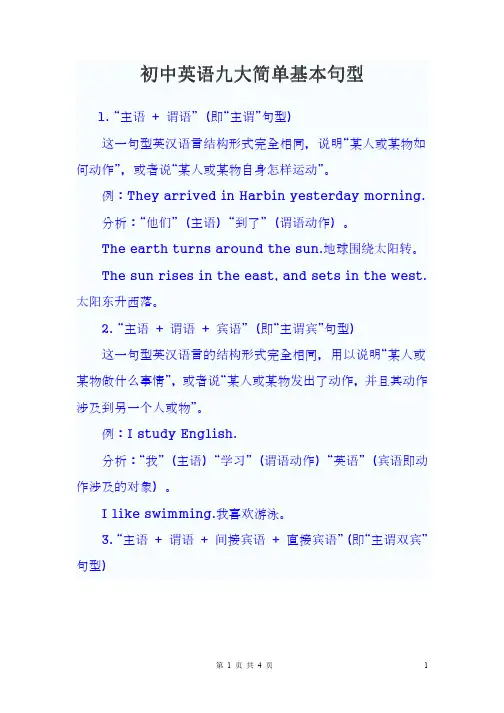
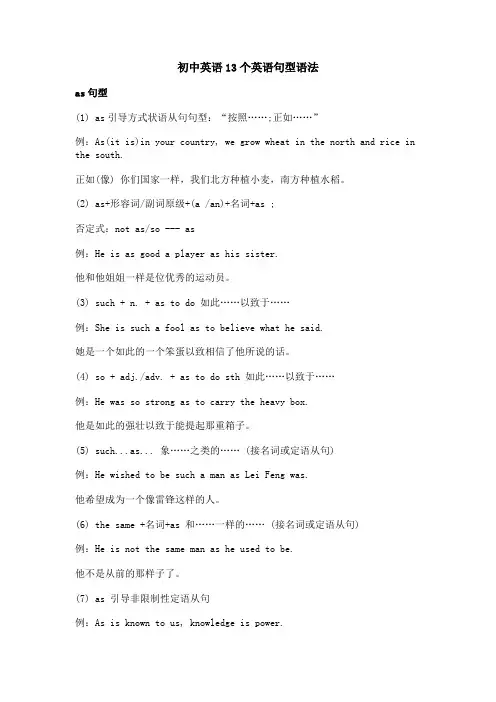
初中英语13个英语句型语法 as句型 (1) as引导方式状语从句句型:“按照……;正如……” 例:As(it is)in your country, we grow wheat in the north and rice in the south.
正如(像) 你们国家一样,我们北方种植小麦,南方种植水稻。 (2) as+形容词/副词原级+(a /an)+名词+as ; 否定式:not as/so --- as 例:He is as good a player as his sister. 他和他姐姐一样是位优秀的运动员。 (3) such + n. + as to do 如此……以致于…… 例:She is such a fool as to believe what he said. 她是一个如此的一个笨蛋以致相信了他所说的话。 (4) so + adj./adv. + as to do sth 如此……以致于…… 例:He was so strong as to carry the heavy box. 他是如此的强壮以致于能提起那重箱子。 (5) such...as... 象……之类的…… (接名词或定语从句) 例:He wished to be such a man as Lei Feng was. 他希望成为一个像雷锋这样的人。 (6) the same +名词+as 和……一样的…… (接名词或定语从句) 例:He is not the same man as he used to be. 他不是从前的那样子了。 (7) as 引导非限制性定语从句 例:As is known to us, knowledge is power. 众所周知,知识就是力量。 (8)引导时间状语从句,与while意义相近 例:We get wiser as we get older. 随着我们长大,我们也变得越来越聪明。 (9) 引导原因状语从句,与 because的用法相近 例:As it was getting very late, we soon turned back.
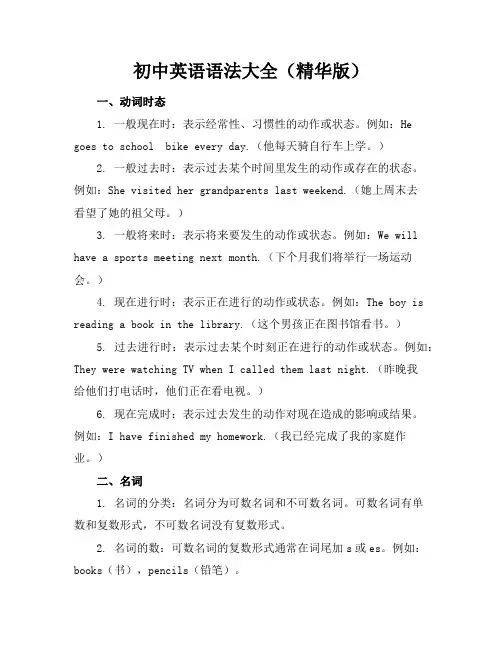
初中英语语法大全(精华版)一、动词时态1. 一般现在时:表示经常性、习惯性的动作或状态。
例如:He goes to school bike every day.(他每天骑自行车上学。
)2. 一般过去时:表示过去某个时间里发生的动作或存在的状态。
例如:She visited her grandparents last weekend.(她上周末去看望了她的祖父母。
)3. 一般将来时:表示将来要发生的动作或状态。
例如:We will have a sports meeting next month.(下个月我们将举行一场运动会。
)4. 现在进行时:表示正在进行的动作或状态。
例如:The boy is reading a book in the library.(这个男孩正在图书馆看书。
)5. 过去进行时:表示过去某个时刻正在进行的动作或状态。
例如:They were watching TV when I called them last night.(昨晚我给他们打电话时,他们正在看电视。
)6. 现在完成时:表示过去发生的动作对现在造成的影响或结果。
例如:I have finished my homework.(我已经完成了我的家庭作业。
)二、名词1. 名词的分类:名词分为可数名词和不可数名词。
可数名词有单数和复数形式,不可数名词没有复数形式。
2. 名词的数:可数名词的复数形式通常在词尾加s或es。
例如:books(书),pencils(铅笔)。
3. 名词的所有格:表示某物属于某人或某事物的关系。
例如:Tom's book(汤姆的书),the teacher's desk(老师的桌子)。
三、冠词1. 不定冠词:a和an。
a用于辅音音素开头的单词前,an用于元音音素开头的单词前。
例如:a dog(一条狗),an apple(一个苹果)。
2. 定冠词:the。
表示特指,指某个特定的人或事物。
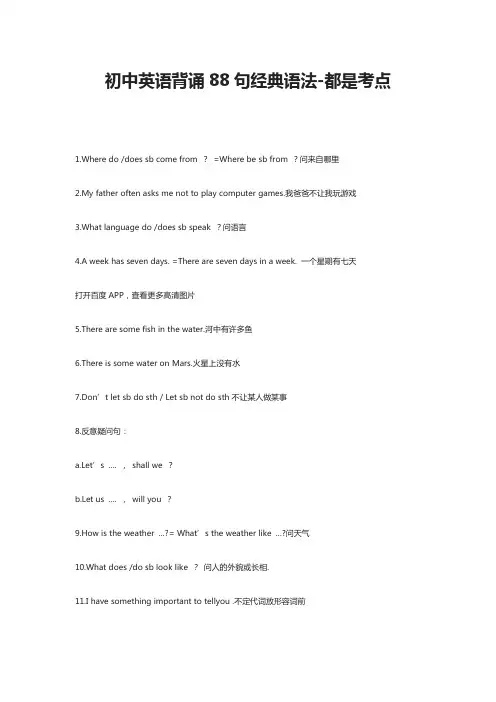
初中英语背诵88句经典语法-都是考点1.Where do /does sb come from ?=Where be sb from ?问来自哪里2.My father often asks me not to play computer games.我爸爸不让我玩游戏3.What language do /does sb speak ?问语言4.A week has seven days. =There are seven days in a week. 一个星期有七天打开百度APP,查看更多高清图片5.There are some fish in the water.河中有许多鱼6.There is some water on Mars.火星上没有水7.Don’t let sb do sth / Let sb not do sth不让某人做某事8.反意疑问句:a.Let’s …. ,shall we ?b.Let us …. ,will you ?9.How is the weather …?= What’s the weather like …?问天气10.What does /do sb look like ?问人的外貌或长相.11.I have something important to tellyou .不定代词放形容词前12.She can speak three languages now .三种语言13.The students stopped talking when the teacher came to the classroom .停止做某事14.They are very tired,but they didn’t want to stop to have a rest .停下来做另外的事15.Who broke the window ?Tom did.助动词代替16.Would you like sth ?的回答:Yes ,please / No ,thanks .想做某事17.Would you like to do sth ?的回答:Yes ,I’d love to / I’d love to ,but … .18.She spent two hours reading a story .spend doing sth19.How about /What about doing sth ?= Why not do sth ?做某事怎么样?20.What was your weekend like ?=how was your weekend ?问周末过得怎么样?21.The teacher is watching them playing football.看见某人做某事22.I often watch her play football.看过某人做某事23.It’s time for sb to do sth.该到某人干某事的时间了24.We had great fun playing in the water .做某事很开心25.He found it was hard to work out the math problem .=He found it hard to work out the math problem.26.be made to do sth.被迫干某事27.make +oneself +过去分词。
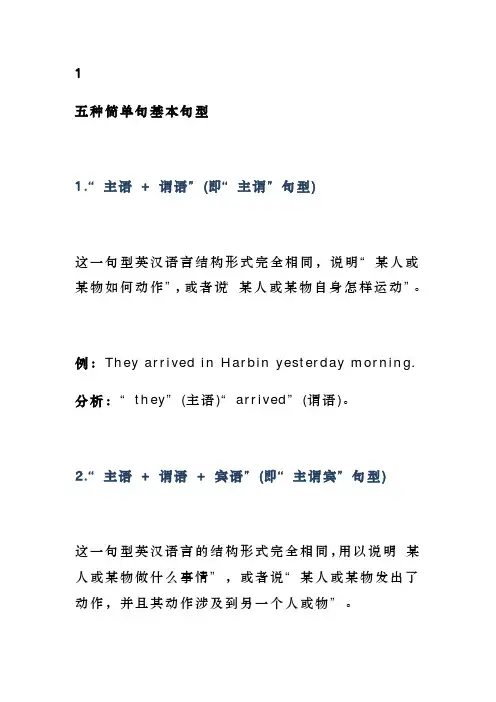
1五种简单句基本句型1.“主语+谓语”(即“主谓”句型)这一句型英汉语言结构形式完全相同,说明“某人或某物如何动作”,或者说“某人或某物自身怎样运动”。
例:They arrived in Harbin yesterday morning.分析:“they”(主语)“arrived”(谓语)。
2.“主语+谓语+宾语”(即“主谓宾”句型)这一句型英汉语言的结构形式完全相同,用以说明“某人或某物做什么事情”,或者说“某人或某物发出了动作,并且其动作涉及到另一个人或物”。
例:I study English.分析:“I”(主语)“study”(谓语动作)“English”(宾语即动作涉及的对象)。
3.“主语+谓语+间接宾语+直接宾语”(即“主谓双宾”句型)这一句型英汉语序结构相同,说明“某人为谁(间接宾语为人)做某事”,或者说“某人或物的运动涉及到两个对象,其中一个间接对象为人,另一个为物”。
例:Our teacher taught us English.分析:“our teacher”(主语)“教”(谓语动作)“us”(间接宾语)“English”(直接宾语)。
4.“主语+谓语+宾语+宾语补足语”(即“主谓宾宾补”句型)这一句型说明“某人或某物要求(使、让)某人做什么”或“某人感觉某人或物怎么样”。
例:He asked her to go there.分析:“he”(主语)“asked”(谓语动作)“her”(宾语即动作涉及的对象)“to go there”(补语--补充说明宾语做什么)。
5.“主语+系动词+表语”(即“主系表”句型)这一句型用以说明“某人(某物、某事、某种概念)具有什么特征或处于什么状态”。
汉语的“是”字结构属于这一英语句型的形式之一。
常用的系动词有be, keep,lie, remain, stand, become, fall, get, go,grow, turn, look, feel, seem,smell, sound, taste,等。
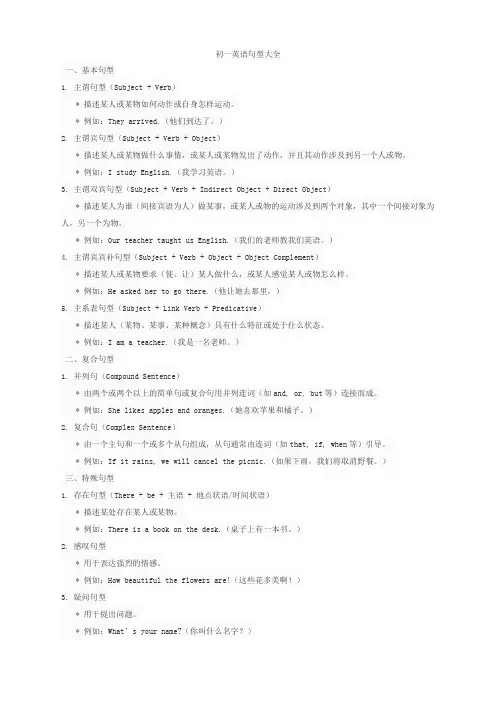
初一英语句型大全一、基本句型1. 主谓句型(Subject + Verb)* 描述某人或某物如何动作或自身怎样运动。
* 例如:They arrived.(他们到达了。
)2. 主谓宾句型(Subject + Verb + Object)* 描述某人或某物做什么事情,或某人或某物发出了动作,并且其动作涉及到另一个人或物。
* 例如:I study English.(我学习英语。
)3. 主谓双宾句型(Subject + Verb + Indirect Object + Direct Object)* 描述某人为谁(间接宾语为人)做某事,或某人或物的运动涉及到两个对象,其中一个间接对象为人,另一个为物。
* 例如:Our teacher taught us English.(我们的老师教我们英语。
)4. 主谓宾宾补句型(Subject + Verb + Object + Object Complement)* 描述某人或某物要求(使、让)某人做什么,或某人感觉某人或物怎么样。
* 例如:He asked her to go there.(他让她去那里。
)5. 主系表句型(Subject + Link Verb + Predicative)* 描述某人(某物、某事、某种概念)具有什么特征或处于什么状态。
* 例如:I am a teacher.(我是一名老师。
)二、复合句型1. 并列句(Compound Sentence)* 由两个或两个以上的简单句或复合句用并列连词(如and, or, but等)连接而成。
* 例如:She likes apples and oranges.(她喜欢苹果和橘子。
)2. 复合句(Complex Sentence)* 由一个主句和一个或多个从句组成,从句通常由连词(如that, if, when等)引导。
* 例如:If it rains, we will cancel the picnic.(如果下雨,我们将取消野餐。
1 江西省吉安县凤凰中学初中英语语法复习 基本句型翻译 8. I can’t wait to pack my bag. 我等不及打我的包了。 9. Let’s hurry so that we can get there before supper. 让我们抓紧时间,这样才能在晚饭前赶到那里。 My father lives so far away that we hardly see him. 我父亲住在很远的地方,所以我们难得见到他。 I bought a boat so that I could go fishing. 我买了一条船,这样我就可以去钓鱼了。(过去时) 10. The harder you work, the higher marks you’ll get. 你学习越努力,你的成绩就越好。 11. Don’t be late for the concert. 去听音乐会可别迟到了。 12. It’s said that he gets on well with others. 据说他和别人相处的很好。 13. He enjoys reading in bed. 他躺在床上津津有味地看书。 She kept on working although she was tired. 她虽然累了,但仍然继续工作。 They are busy getting ready for the party. 他们正忙着为聚会作准备。 14. He often tells me not to play a joke on the old people. 他经常告戒我不要和老年人开玩笑。 Miss Gao told me not to be late for class. 高老师告诉我上课别迟到。 15. I saw the man pull a gun out of his pocket. 我看见那人从口袋里掏出了一把枪. When we were walking across the bridge, we saw a boy fall into the river. 当我们过桥的时候,我们看见一个男孩儿掉进河里。 I heard someone shout “ Fire!” and then I heard people running and shouting. 我听到有人高喊“着火啦!”,接着我又听到人们在边跑边喊。 16. They made us play football in the rain. 他们让我们冒雨踢足球。 The medicine will make you better. 这药会使你好转。 They made it clear that they didn’t agree with you. 他们明确表示他们并没有同意你的意见。 17. The girl is too young to get married. 这姑娘还太年幼,还不能结婚。 The hotel is too expensive for us to stay in. 这宾馆收费太贵了,我们可住不起。 18. He is not only a writer but also an actor. 他不但是一位作家,还是一位演员。 2
19. I prefer trains to buses. 我喜欢火车,不喜欢公共汽车。 He prefers traveling by train to sitting in a bus. 他喜欢坐火车旅行,而不喜欢坐公共汽车旅行。 20. Both he and his father do morning exercises every day. 他和他父亲每天都做早操。 21. Neither she nor I failed the history exam. 她和我历史考试都没有不及格。 22. He will come back either this Sunday or Saturday. 他将于星期日或星期六回来。 23. The TV play didn’t start until (it was) ten o’clock last night. 昨天夜里电视剧十点钟才开始。 24. I’m afraid of flying. / dogs. 我害怕乘坐飞机。/怕狗。 He feels afraid to tell his wife what he has done. 他不敢把自己做的事告诉妻子。 25. I don’t think the meeting room can hold two hundred people. 我想这间会议室容纳不下二百人。 26. Stop making that noise. 别这么吵闹。 We stopped (walking) to have lunch in a village pub.我们停下来在一家乡村小酒馆吃午饭 27. It’s dangerous (for you) to drive so fast.(你)车开得这么快是危险的。 It’s impossible for him to work out this maths problem. 他解出这道数学题是不可能的。 I found it impossible to work out this maths problem. 我发现他解出这道数学题是不可能的。 28. He showed me his new suit. / He showed his new suit to me. 他向我展示他的新服装。(两种方法) She bought a dress for me. She bought me a new dress. 她给我买了一件连衣裙。 29. She spent a lot of money on clothes. 她花很多钱买衣服。 She spent a lot of time surfing. 她花很多时间玩冲浪。 He paid $10 for the book. The book cost him $10. 他花了10美元买这本书。(两种方法) 30. What do you mean by “baozi”? “baozi”是什么意思? 31. What/How about having a rest? /(having) a try? 休息一会儿/尝试一下怎么样? 32. Why not make friends with him? 何不跟他交个朋友? 33. It’s better to make up your mind. 你最好下定决心。 It’s best to wear silk clothes in summer. 在夏季最好穿丝绸衣服。 34. The river is 50 kilometres long and two metres deep. 这条河有50公里长两米深。 35. Your cake is as delicious as mine. 你的蛋糕和我的蛋糕一样好吃。 He doesn’t run so / as fast as you. 他不如我跑得快。 36. He often helps me with my Chinese. 他经常帮助我学习语文(或中文)。 He often helps me do the homework. 他经常帮助我做家庭作业。 37. What do you think of the novel? 你认为这本小说怎么样?(两种方法) How do you like the novel? 38. He likes cooking very much. So do I. / So does he. 他非常喜欢做饭。我也一样。/他也一样。 He is American. So is Jim. 他是美国人。吉姆也是。 39. Don’t forget to post the letter on your way home. 别忘了在你回家的路上把这 3
封信寄了。 Did you remember to send your mother a birthday card last week? 上星期你没有忘记给你母亲寄生日卡吧? I’ll never forget seeing the girl for the first time. 我将终生难忘初次见到那位姑娘的情景。 40. Forests help to keep water from running away. 森林有助于防止水分流失。 The Great Green Wall will stop the sand from moving towards the rich farmland. 绿色长城将阻挡沙子侵蚀肥沃的农田。 41. I prefer to do shopping on the Internet rather than go to the shop. 比起去商店购物,我更喜欢网上购物。 42. He has nothing to do with the club. 他和那家俱乐部没有关系。 43. Tom made such a noise that his sister told him to be quiet. 汤姆太吵闹了以至他姐姐叫他安静点。 His idea was such a good one that we all agreed to use it.他的想法是如此的好以至我们一致同意采纳它。 44. We are proud of what you’ve done. 我们为你所做的感到骄傲。 We are proud of out city. 我们为我们的城市感到自豪。 45. He was soon able to sit up and read. 他很快就能坐起来看书了。